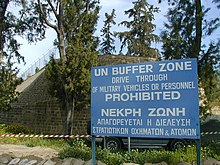Ban Ki-Moon says Cyprus solution "possible"
Monday, February 1, 2010

Image: World Economic Forum.

Image: Jpatokal.
A new set of talks are scheduled to attempt to reunite Cyprus, prompting UN Secretary General Ban Ki-Moon to say that a solution is "possible and within reach" when he arrived in the country yesterday for talks between Greek and Turkish-Cypriot leaders that will take place later today.
Progress have been slow for the peace talks, which started in September 2008, but the UN chief said that a deal would require "courage, flexibility and vision as well as a spirit of compromise". "I am under no illusion that the Cyprus problem is easy to solve", he told reporters after he arrived in Larnaca yesterday in preparation for the talks with Greek Cypriot leader Demetris Christofias and Turkish Cypriot Mehmet Ali Talat today.
Ban said that "solving the Cyprus problem will give inspiration to all those around the world trying to solve other seemingly intractable problems and I'm looking forward to having good meetings with the leaders", with the Greek and Turkish Cypriot leaders saying that they are committed to finding a solution. Monday's talks will involve Ban holding talks with the two leaders individually, before chairing a meeting between the pair. Any deal that emerges will be a subject of two simultaneous referendums, one for each side of the border. Both sides agree that "nothing is agreed until everything is agreed".
Jonny Dymond, the BBC Europe correspondent, has expressed fears that time is running out on a solution. There are also worries that the fast approaching northern Cyprus leadership elections will mean that Talat is replaced by nationalist Dervis Eroglu, who is leading in opinion polls. If this were to happen, talks might be shelved.
Cyprus has been divided since 1974, after Turkish forces invaded after a coup led by Greece allegedly aimed to absorb it. Northern Cyprus is only recognised as a state by Turkey.
Sources
- "UN chief Ban Ki-moon says Cyprus solution 'possible'" — BBC News Online, January 31, 2010
- "UN chief lands on divided Cyprus with message of peace" — AFP, January 31, 2010